Forensics by Val McDermid

Author:Val McDermid
Language: eng
Format: epub
Publisher: Profile Books
Ethical issues persist. Troy Duster, a sociologist at New York University, points out that because incarceration rates in the US are eight times higher for black people than for white people (for socio-political reasons, including alleged racism on the part of the authorities), familial searches are much more likely to help convict black criminals. The profiles of around two in five of the black men in the UK are on the national DNA database, compared to around one in ten white men. In US, around 40 per cent of the DNA profiles in the federal database are African-Americans, who make up about 12 per cent of the national population. It is predicted that the DNA profiles of Latinos (about 13 per cent of the population) will soon show a similar skew, mainly due to crimes surrounding immigration.
One way to gradually level the playing field would be to profile everybody. Already the UK national DNA database has over 6 million profiles, a higher proportion (10 per cent) of its citizens than any other country in the world. DNA from everyone arrested (whether convicted of a crime or not) was held on the database indefinitely until a decision by the European Court of Human Rights in 2008 forced a change. In 2012–13 profiles of 1.7 million innocent people were deleted from the database. Alec Jeffreys had called for this in 2009: ‘My view is very simple … innocent people do not belong on the database. Branding them as future criminals is not a proportionate response in the fight against crime.’
Because so many crimes are committed by repeat offenders, the national database is a powerful police tool. In 2013, 61 per cent of DNA profiles found at crime scenes found matches in the database. The Home Office doesn’t record how many of these matches led to a conviction, but it’s a formidable help to the police forces, some of whom have advocated mandatory profiling. But others believe that would lead to more false assumptions. DNA from several people is often present at one crime scene for perfectly innocent reasons, particularly since scientists can now produce results from such minute quantities.
This nightmare scenario, along with issues of personal privacy and the huge bureaucratic cost of profiling 60 million people, is probably enough to put the matter to rest for now. In addition, some worry that mandatory profiling would make it easier for criminals to frame innocent people. A defence barrister once put the framing idea to Val Tomlinson in court, claiming that his client’s LCN DNA had been planted at the scene by an anonymous other. To prove it, he asked Val a hypothetical question:
‘If you were going to set somebody up for this how would you go about doing it?’
‘I don’t think I could,’ said Val.
In Val’s experience most set-ups fall down on basic points. ‘Children go over the top when they are trying to cover up for their mistakes. And you tend to find that people who frame others distribute too much
Download
This site does not store any files on its server. We only index and link to content provided by other sites. Please contact the content providers to delete copyright contents if any and email us, we'll remove relevant links or contents immediately.
When Breath Becomes Air by Paul Kalanithi(7369)
Why We Sleep: Unlocking the Power of Sleep and Dreams by Matthew Walker(5761)
Paper Towns by Green John(4255)
The Immortal Life of Henrietta Lacks by Rebecca Skloot(3895)
The Sports Rules Book by Human Kinetics(3667)
Dynamic Alignment Through Imagery by Eric Franklin(3567)
ACSM's Complete Guide to Fitness & Health by ACSM(3524)
Kaplan MCAT Organic Chemistry Review: Created for MCAT 2015 (Kaplan Test Prep) by Kaplan(3486)
Introduction to Kinesiology by Shirl J. Hoffman(3359)
Livewired by David Eagleman(3207)
The River of Consciousness by Oliver Sacks(3056)
The Death of the Heart by Elizabeth Bowen(2972)
Alchemy and Alchemists by C. J. S. Thompson(2958)
Descartes' Error by Antonio Damasio(2807)
Bad Pharma by Ben Goldacre(2787)
The Gene: An Intimate History by Siddhartha Mukherjee(2557)
Kaplan MCAT Behavioral Sciences Review: Created for MCAT 2015 (Kaplan Test Prep) by Kaplan(2534)
The Fate of Rome: Climate, Disease, and the End of an Empire (The Princeton History of the Ancient World) by Kyle Harper(2511)
The Emperor of All Maladies: A Biography of Cancer by Siddhartha Mukherjee(2509)
